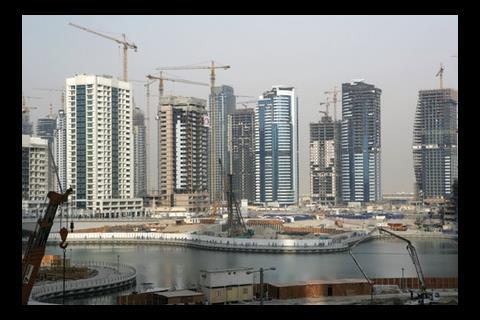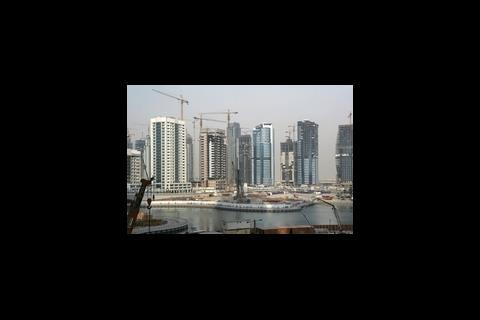Ambitious engineers and QSs join housebuilding specialists in search for Middle Eastern work
UK consultants have been vying for a slice of the lucrative Middle East market for half a century, but as things tighten at home, the region has become a sponge for surplus staff.
In August, Chris Cole, WSP’s chief executive, said his firm could send as many as 250 employees east over the next year. Meanwhile, QS Faithful + Gould is considering a restructure to maximise revenues from the region and Gleeds is “recruiting hard” on the firm’s intranet for staff to work in its Gleeds Gulf division. Stockbroker KBC Peel Hunt predicts consultant Atkins will follow suit.
Philip Youell, chief executive of EC Harris, which has 620 people in the region, has noticed more of the firm’s UK competitors appearing in Dubai and says there is a “definite sense” they are growing their offices there.
He says the shift is driven as much by individuals as firms. “Many professionals are wondering what the coming years will hold,” he says. “They’re wondering if their employers are going to be able to keep them occupied in the UK.”
Vince Clancy, chief executive of Turner & Townsend, agrees that it is getting easier to find people willing to up sticks. The firm’s operation in the Middle East has grown from 20 people at the start of the year to 100, and it plans to reach 150 in six months.
“The younger generation sees going to the Middle East as a good career move. The scale and size of projects is second to none, so you can enhance your CV.”
The scale and size of projects is second to none there, so you can enhance your CV
Vince Clancy, Turner & Townsend
Another factor sucking people into the region is that it is easy to find work – a big consideration for the thousands of housebuilding workers who have lost their jobs. “Staff who were working in the residential sector are in immense demand in the Middle East,” says Stephanie Wray, an area manager at Hyder.
Not everyone is having an easy time recruiting expats, however. Gleeds Gulf has seen fewer applications than expected. Alan Turner, its managing director, says: “After the financial crisis of the past couple of weeks, you’d imagine we’d be flooded with people, but we aren’t. I don’t think a lot of people have woken up to the fact that there are going to be issues in the UK. ”
To encourage people to go abroad, companies are adopting flexible working arrangements. Hyder Consulting, which has 1,500 people in the region, runs a “tag team” scheme, whereby one role in the Middle East is filled by two people on a rotating basis. Cyril Sweett allows staff to work abroad for six to eight months before taking the full plunge.
With Dubai and Abu Dhabi spending billions on high-profile projects, firms are keen to establish themselves as fast as possible, but those trying to balance their books this way must be prepared to spend money up front. Simon Harden, international director at engineer Waterman, estimates that each member of staff can cost up to £30,000 in the first few months. Much of that is a recoverable accommodation loan, but the capital outlay on, say, 100 people will run into the millions.
But with an abundance of work in the desert, many think it is worth the gamble. “Transfers are cheaper than recruiting,” says Tom Smith, director at WSP. “And you know what you are getting – you can trust them to deliver.”
Expenses to consider
Plane fare up to £1,000
Moving personal effects up to £1,700 per 100kg
Visas and forms up to £1,000
One month’s accommodation £1,500
Loan for accommodation up to £20,000




























No comments yet